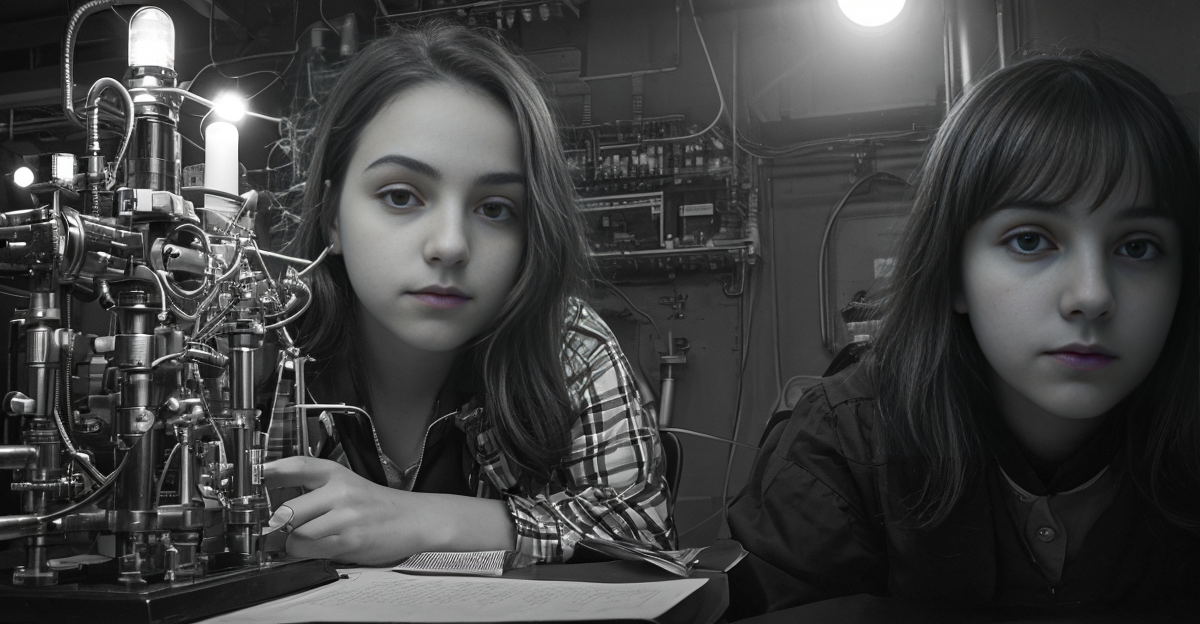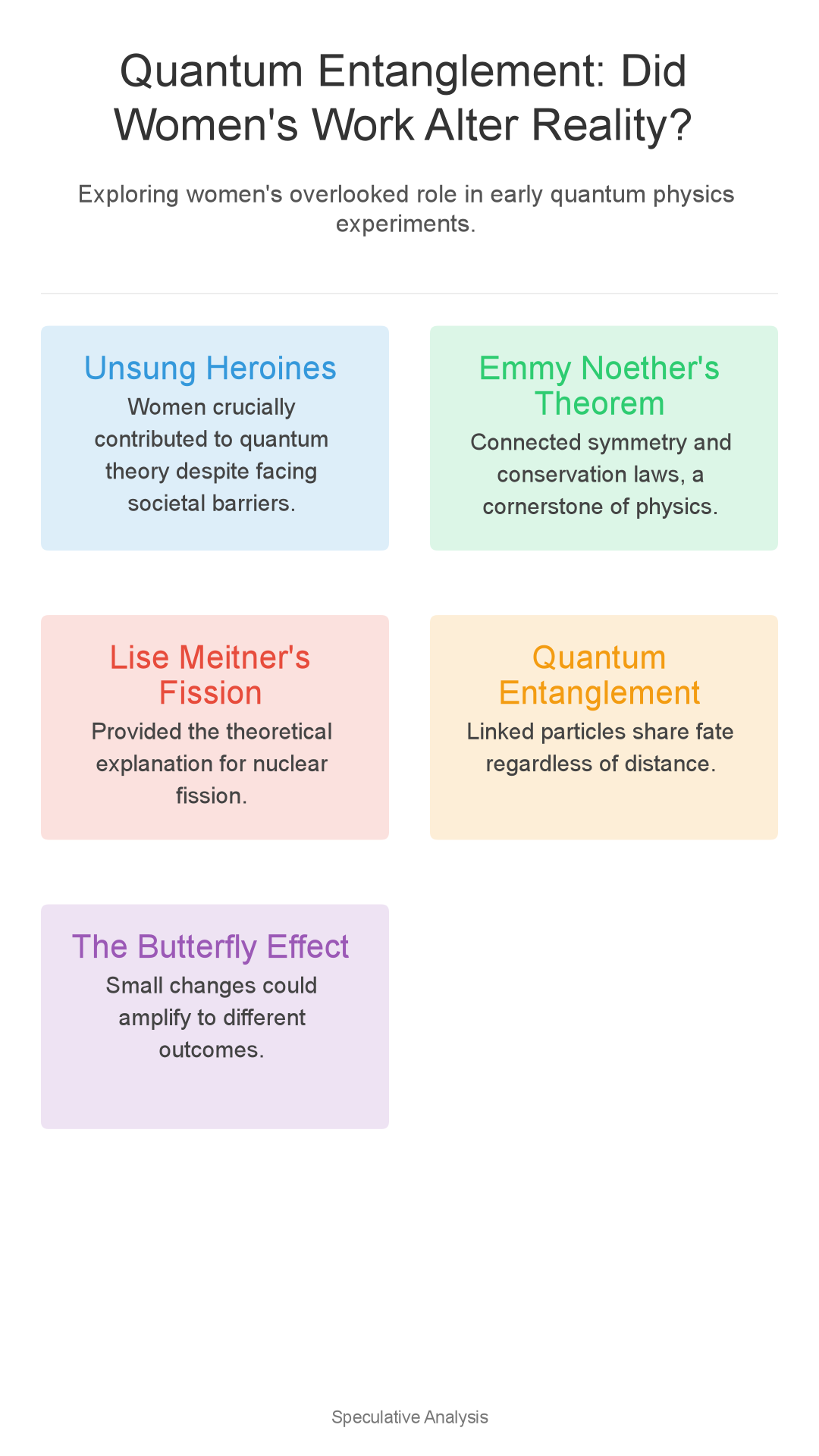
Did female scientists in the 1930s unknowingly alter our timeline through early quantum entanglement
Have you ever wondered if a single, seemingly insignificant action could reverberate through time, subtly reshaping the world we know? What if female researchers in the 1930s, pioneering the then-mysterious field of quantum entanglement, unknowingly nudged our reality onto a slightly different path? Join us as we explore this mind-bending possibility! Hit that like button and follow along!
The year is 1935. The world teeters on the brink of war, and in the quiet laboratories of Europe, a different kind of revolution is underway – a revolution in physics.
Scientists are grappling with the bizarre implications of quantum mechanics, a field so strange that even its founders struggled to fully comprehend it.
Often overlooked in this narrative are the brilliant women whose contributions might have had a far greater impact than we ever imagined.
The Unsung Heroines of Early Quantum Physics
History often portrays science as a male-dominated field, but the reality is far more complex.
Women played a vital role in the development of quantum theory, despite facing immense societal and institutional barriers.
Emmy Noether: The Mathematical Foundation
Emmy Noether, a brilliant German mathematician, laid the theoretical groundwork for much of modern physics.
Her theorem, Noether’s Theorem, elegantly connects symmetry and conservation laws, a cornerstone of both classical and quantum mechanics. Despite her genius, she endured years of unpaid lecturing and persistent academic prejudice.
Lise Meitner: The Nuclear Pioneer
Lise Meitner, an Austrian physicist, was crucial to the discovery of nuclear fission. She provided the theoretical explanation for Otto Hahn’s experiments, yet Hahn alone received the Nobel Prize.
Meitner’s Jewish heritage and the rise of Nazism further complicated her career, forcing her to flee Germany. Imagine the scientific breakthroughs she could have achieved without such blatant discrimination!
What if she had been allowed to fully develop the theoretical underpinnings of nuclear energy?
Others: A Chorus of Unsung Voices
Beyond these prominent figures, countless other women contributed to the field, working as research assistants, technicians, and even theoretical physicists, often in the shadows.
Their dedication, frequently uncredited, helped shape our understanding of the quantum world. We can only speculate about the discoveries that might have been made if these women had been granted equal opportunities and recognition.
Quantum Entanglement: The Spooky Action and its Early Investigations
At the heart of our speculative journey lies quantum entanglement, a phenomenon Einstein famously dubbed “spooky action at a distance.” But what is it, precisely?
Entanglement Explained: Connected Across Space
Imagine two particles, inextricably linked, sharing the same fate regardless of the distance separating them.
When you measure a property of one particle (like its spin), you instantly know the corresponding property of the other, even if they are light-years apart. This instantaneous connection defied classical physics and continues to intrigue scientists.
Early Experiments: Primitive but Powerful
In the 1930s, experiments designed to test entanglement were incredibly challenging.
Technology was limited, and researchers relied on meticulous observation and painstakingly crafted apparatuses.
The inherent uncertainty in quantum mechanics meant that results were often probabilistic, requiring numerous repetitions to obtain meaningful data.
The Human Element: Unintentional Influences
Consider this: the researchers themselves were integral parts of the experimental system.
Their presence, subtle movements, and even unconscious biases could conceivably introduce minute variations. Could these unintentional influences have nudged the quantum probabilities in one direction or another?
The Butterfly Effect in Quantum Experiments: A Speculative Perspective
Now, let’s consider the Butterfly Effect – the idea that a small change in initial conditions can lead to dramatically different outcomes over time.
Quantum Chaos: Amplifying Small Changes
In the complex realm of quantum mechanics, even the smallest variations can be amplified over time.
A slight shift in the initial state of an entangled particle, perhaps caused by a researcher’s unintentional interference, could propagate through the system, affecting subsequent measurements and potentially influencing the long-term evolution of the quantum state.
Let’s indulge in some speculation. Imagine a female researcher, perhaps facing societal pressure or working under immense stress, unconsciously altered the setup of an entanglement experiment in a subtle way.
This seemingly insignificant change could have shifted the probabilities of certain quantum events, leading to a slightly different outcome.
Over time, these small differences could have compounded, rippling through the fabric of reality and ultimately leading to the world we know today.
Limitations: Acknowledging the Unknown
Of course, this is highly speculative. The universe is incredibly complex, and tracing causal chains back to specific events in the 1930s is virtually impossible.
We simply don’t have enough information to definitively say whether these experiments altered our timeline.
Ethics and Responsibility in Scientific Exploration
This thought experiment raises important ethical questions about the responsibility of scientists. As we push the boundaries of knowledge, particularly in areas like quantum mechanics, we must consider the potential unintended consequences of our research.
Unforeseen Impacts: Considering the Possibilities
Scientists have a duty to carefully consider the potential risks associated with their work, even in theoretical realms.
While we cannot predict the future with certainty, we can engage in thoughtful analysis and risk assessment to minimize the likelihood of unforeseen negative impacts.
Balancing Curiosity and Caution: A Delicate Act
The pursuit of knowledge is essential for human progress, but it must be tempered with caution and a deep sense of ethical responsibility.
We must strive to strike a balance between scientific curiosity and the potential for unforeseen societal or existential impacts.
So, what do *you* think? Could seemingly minor adjustments made during early quantum entanglement experiments have subtly altered the course of our reality? Share your thoughts in the comments below!
If you enjoyed this dive into the weird and wonderful world of quantum physics and its historical context, be sure to subscribe for more mind-bending explorations! We’ll be tackling other fascinating topics soon.

Enjoyed this? Check out our YouTube channel for video versions!
Enjoyed this? Check out our YouTube channel for video versions!



